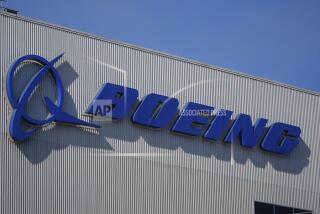McDonnell Douglas Slowdown Delays Deliveries
- Share via
McDonnell Douglas Corp. has notified customers that aircraft deliveries from its massive Long Beach plant will be delayed this year because of a continuing work slowdown by thousands of union employees who have been working without a contract since October, a company spokesman said Thursday.
McDonnell Douglas made all 101 aircraft deliveries on schedule last year, but two one-day work stoppages in December and ongoing labor unrest have now forced it to reschedule delivery of dozens of jetliners and a few military cargo planes, spokesman Dave Eastman said.
“We have experienced a slowdown. . . . We have notified our customers that there is going to be a change in the schedule for 1987,” Eastman said.
Eastman said McDonnell Douglas may have to pay penalty fees to some companies for the delayed deliveries, but he would not comment in detail. Nor would he say how long deliveries will be delayed.
McDonnell Douglas was expected to deliver between 100 and 125 aircraft to airlines and the U.S. Air Force in 1987, but Eastman declined to estimate how many might be delayed.
However, spokesmen for two major customers--Delta Airlines and Texas Air--said McDonnell Douglas had told them to expect delays of several weeks. An American Airlines spokesman also said his company had been notified that 19 MD-88 jetliners it expects by late July will be late.
Texas Air spokesman Bruce Hicks said winter and spring deliveries to Texas Air, which ordered 12 new MD-88s, have been pushed back six weeks. Later delivery dates have not been determined, he said.
The airline spokesmen said the delays probably will not cause major problems. “But obviously that depends upon the outcome of the McDonnell Douglas labor situation,” Delta’s Dick Jones said.
The slowdown will not affect production of McDonnell Douglas’ new MD-11 wide-body jetliner, which received production approval last week but will not be on the assembly line for 15 months. About 85% of the planes now produced are the MD-80 series of passenger jets. The plant also produces the DC-10 jetliner and the KC-10 cargo plane.
Negotiations broke off last month between McDonnell Douglas and two unions that represent about 15,000 aerospace workers at Douglas Aircraft Co. plants in Long Beach and Torrance and McDonnell Douglas Astronautics in Huntington Beach. Only the Long Beach and Torrance plants build jetliners, but all three sites are experiencing work slowdowns, said union officials.
The unions--the United Auto Workers and the International Assn. of Machinists--have twice rejected contract offers, primarily because of proposed increases in health insurance costs and changes in work rules that the unions say would undercut worker seniority.
The proposed three-year contract includes a 3% general wage increase in the first year and 2% in the second year. The contract proposal also includes annual lump-sum payments of 2% to 4% per year based on earnings. McDonnell Douglas calls it the best in the aerospace industry.
The production slowdown, though not formally sanctioned by the unions, has been evident since October and has intensified since negotiations reached an impasse and the company implemented part of its proposal in December, union officers said.
“There are huge holes in production, and in 60 to 90 days this company will not be able to deliver airplanes,” said Bob Berghoff, president of the United Auto Workers’ Local 148, which represents 9,500 workers at the 21,000-employee Long Beach facility.
Berghoff and Mike Smith, president of the International Assn. of Machinists, District 720, which represents 5,000 workers in Torrance and Huntington Beach, said they were coordinating their efforts.
To increase pressure on the company, Berghoff and Smith said they have called a joint meeting of the two unions Jan. 17 to devise a common bargaining strategy.
Berghoff said he would probably then set a UAW meeting for Jan. 19 and will ask members for authorization to strike, which requires a two-thirds vote. A previous request narrowly failed to get the required two-thirds majority. The machinists have already given strike authorization.
More to Read
Inside the business of entertainment
The Wide Shot brings you news, analysis and insights on everything from streaming wars to production — and what it all means for the future.
You may occasionally receive promotional content from the Los Angeles Times.










